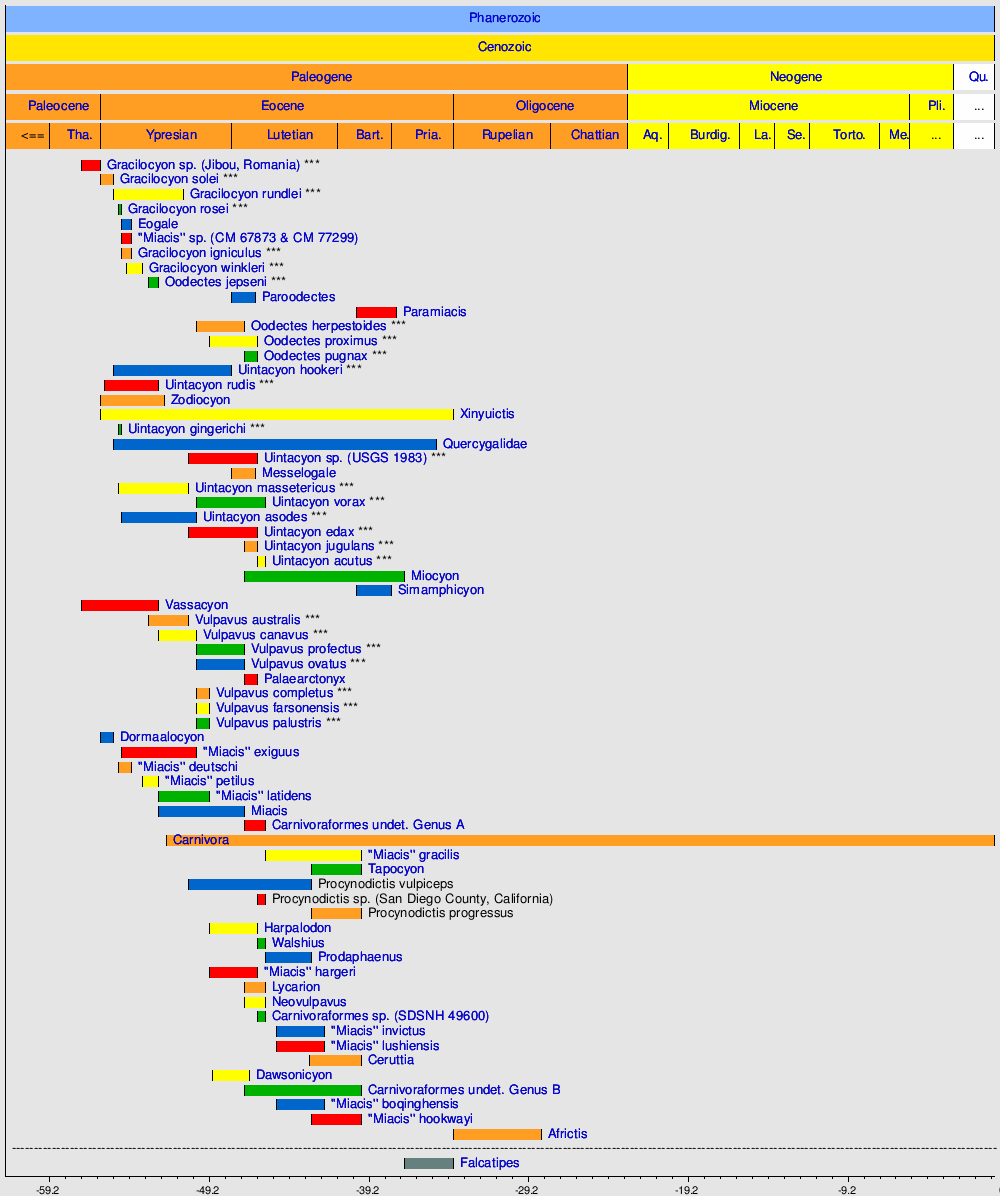Procynodictis
izumrli rod placentalni sisara
Procynodictis (Процинодиктис — „прије Цинодиктиса”) је изумрли род плацентални сисара из кладуса Carnivoraformes, који је у периоду од раног до средњег еоцена настањивао подручје Сјеверне Америке.[3][4]
| Procynodictis Временски распон: рани до средњи еоцен
| |
|---|---|

| |
| илустрација доње вилице врсте Procynodictis vulpiceps | |
| Научна класификација | |
| Домен: | Eukaryota |
| Царство: | Animalia |
| Тип: | Chordata |
| Класа: | Mammalia |
| Кладус: | Pan-Carnivora |
| Кладус: | Carnivoramorpha |
| Кладус: | Carnivoraformes |
| Род: | †Procynodictis Wortman & Matthew, 1899 |
| Типска врста | |
| †Procynodictis vulpiceps Wortman & Matthew, 1899
| |
| Врсте | |
| |
| Синоними[1] | |
|
синоними рода:
синоними врсте:
| |
Етимологија назива
уреди| Род: | Поријекло назива од: | Значење назива: |
|---|---|---|
| Procynodictis |
|
прије Цинодиктиса[5] |
| Врсте: | Поријекло назива од: | Значење назива: |
|---|---|---|
| P. progressus |
|
напредни Процинодиктис |
| P. vulpiceps | лисицоглави Процинодиктис |
Опис
уредиВрста Procynodictis progressus је тежила око 2,14 kg, а Procynodictis vulpiceps је тежила око 2,36 kg.[6]
Систематика
уредиИсторија класификације
уредиРод Procynodictis је у прошлости био уврштаван унутар изумрле породице Miacidae, али је касније препознат као представник кладуса Carnivoraformes.
Класификација
уреди| Врсте: | Распрострањеност фосила и локација: |
Временски распон: |
|---|---|---|
| †P. progressus (Stock, 1935)[7] | САД (Калифорнија)[8][9] | 42,8 до 39,7 мил. год. |
| †P. vulpiceps (Wortman & Matthew, 1899)[10] | САД (Вајоминг, Јута[11] и Тексас) | 50,5 до 42,8 мил. год. |
| †P. sp. [San Diego County, California] (Tomiya, 2013)[12] | САД (округ Сан Дијего у Калифорнији) | 46,2 до 45,7 мил. год. |
Филогенија
уредиДоље приказан кладограм представља филогенетске везе рода Procynodictis.[13][14][15][16]
| Carnivoramorpha |
|
†Gracilocyon/Oodectes група †Vulpavus група | ||||||||||||||||||||||||||||||||||||||||||||||||||||||||||||||||||||||||||||||||||||||||||||||||||||||||||||||||||||||||||||||||||||||||||||||||||||||||||||||||||||||||||||||||||||||||||||||||||||||||||||||||||||||||||||||||||||||||||||||||||||||||||||||||||||||||||||||||||||||||||||||||||||||||||||||||||||||||||
| (Carnivora [sensu lato]) | ||||||||||||||||||||||||||||||||||||||||||||||||||||||||||||||||||||||||||||||||||||||||||||||||||||||||||||||||||||||||||||||||||||||||||||||||||||||||||||||||||||||||||||||||||||||||||||||||||||||||||||||||||||||||||||||||||||||||||||||||||||||||||||||||||||||||||||||||||||||||||||||||||||||||||||||||||||||||||||
Временска распрострањеност рода Procynodictis унутар кладуса Carnivoraformes
уреди
Види још
уредиРеференце
уреди- ^ J. Alroy (2002.) "Synonymies and reidentifications of North American fossil mammals."
- ^ а б Simpson, George Gaylord (1945). „The principles of classification and a classification of mammals”. Bulletin of the American Museum of Natural History. 85: 350. hdl:2246/1104.
- ^ McKenna, Malcolm C.; Bell, Susan K. (1997). Classification of Mammals Above the Species Level. New York: Columbia University Press. стр. 9—10. ISBN 978-0-231-11012-9. Приступљено 16. 3. 2015.
- ^ J. J. Flynn (1998.) "Early Cenozoic Carnivora ("Miacoidea")." In C. M. Janis, K. M. Scott, and L. L. Jacobs (eds.) "Evolution of Tertiary Mammals of North America. Volume 1: Terrestrial Carnivores, Ungulates, and Ungulatelike Mammals." Cambridge University Press, Cambridge. ISBN 9780521355193
- ^ Palmer, Theodore Sherman (1904). Index Generum Mammalium: A List of the Genera and Families of Mammals (на језику: енглески). U.S. Government Printing Office.
- ^ Juhn, M. S.; Balisi, M. A.; Doughty, E. M.; Friscia, A. R.; Howenstine, A. O.; Jacquemetton, C.; Marcot, J.; Nugen, S.; Van Valkenburgh, B. (2024). „Cenozoic climate change and the evolution of North American mammalian predator ecomorphology”. Paleobiology: 1—10. doi:10.1017/pab.2024.27 .
- ^ C. Stock (1935.) "Plesiomiacis, a New Creodont from the Sespe Upper Eocene, California." Proceedings of the National Academy of Sciences 21(2):119-122
- ^ D. J. Golz and J. A. Lillegraven (1977.) "Summary of known occurrences of terrestrial vertebrates from Eocene strata of southern California." Contributions to Geology, University of Wyoming 15(1):43-65
- ^ T. S. Kelly (1990.) "Biostratigraphy of Uintan and Duchesnean land mammal assemblages from the Middle Member of the Sespe Formation, Simi Valley, California." Contributions in Science, Natural History Museum of Los Angeles County 419:1-42
- ^ J. L. Wortman and W. D. Matthew (1899.) "The ancestry of certain members of the Canidae, the Viverridae, and Procyonidae." Bulletin of the American Museum of Natural History 12(6):109-138
- ^ Anthony R. Friscia and D. Tab Rassmussen (2010) „Middle Eocene Carnivoramorpha of the Uinta Basin, Utah”. Annals of Carnegie Museum, vol. 79 (1), pp. 51-63
- ^ Tomiya, Susumu (2013). „New carnivoraforms (Mammalia) from the middle Eocene of California, USA, and comments on the taxonomic status of "Miacis" gracilis” (PDF). Palaeontologia Electronica. 16 (2): Article number 16.2.14A.
- ^ Flynn, John J.; Finarelli, John A.; Spaulding, Michelle (2010). „Phylogeny of the Carnivora and Carnivoramorpha, and the use of the fossil record to enhance understanding of evolutionary transformations”. Ур.: Goswami, Anjali; Friscia, Anthony. Carnivoran evolution. New views on phylogeny, form and function. Cambridge University Press. стр. 25–63. ISBN 9781139193436. doi:10.1017/CBO9781139193436.003.
- ^ Solé, Floréal; Smith, Richard; Coillot, Tiphaine; de Bast, Eric; Smith, Thierry (2014). „Dental and tarsal anatomy of Miacis latouri and a phylogenetic analysis of the earliest carnivoraforms (Mammalia, Carnivoramorpha)”. Journal of Vertebrate Paleontology. 34 (1): 1—21. ISSN 0272-4634. doi:10.1080/02724634.2013.793195.
- ^ Solé, Floréal; Smith, Thierry; De Bast, Eric; Codrea, Vlad; Gheerbrant, Emmanuel (2016). „New carnivoraforms from the latest Paleocene of Europe and their bearing on the origin and radiation of Carnivoraformes (Carnivoramorpha, Mammalia)”. Journal of Vertebrate Paleontology. 36 (2): e1082480. ISSN 0272-4634. doi:10.1080/02724634.2016.1082480.
- ^ Tomiya, S.; Zack, S. P.; Spaulding, M.; Flynn, J. J. (2021). „Carnivorous mammals from the middle Eocene Washakie Formation, Wyoming, USA, and their diversity trajectory in a post-warming world”. Journal of Paleontology. 95 (Supplement S82): 1—115. doi:10.1017/jpa.2020.74.
Литература
уреди- O. P. Hay (1902) "Bibliography and Catalogue of the Fossil Vertebrata of North America." Bulletin of the United States Geological Survey 179:1-868
- X. Wang (1994.) "Phylogenetic systematics of the Hesperocyoninae (Carnivora: Canidae)." Bulletin of the American Museum of Natural History 221:1-207
- Flynn, John J.; Galiano, Henry (1982). „Phylogeny of Early Tertiary Carnivora, With a Description of a New Species of Protictis From the Middle Eocene of Northwestern Wyoming”. American Museum Novitates. 2725: 1—64.
- Donald R. Prothero and Robert J. Emry (1996.) The Terrestrial Eocene-Oligocene Transition in North America ISBN 978-0-521-43387-7